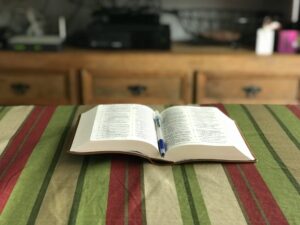Ding ding, ding ding, ding ding went the machines in the hospital tracking my baby’s oxygen saturation.
They had been stable and in a healthy range all afternoon. I was starting to feel hope that we could go home the next morning. But then night came.
His oxygen levels kept dipping too low and struggling to come back up. I paced back and forth anxiously watching the numbers, the exhaustion from several days in the hospital weighing on me. The nurse came in and increased his oxygen support. I felt gutted. Not only would we not be going home the next morning but it might be several more days away.
I can’t keep doing this, I thought. It’s just too hard to have a sick baby. Why can’t I have a healthy baby at home like so many of my friends? The grief threatened to overwhelm me.
I was right. It IS too hard to have a sick baby. In 6 months we were admitted to hospital twice: the first time at 7 weeks for severe RSV to a specialized children’s hospital in the ICU; the second time at 6 months in our local hospital for more breathing concerns due to a normal cold.
Both hospital stays felt eerily similar. They were exhausting and stressful. Amid everything going on, I needed hope to cling onto. Real, true, everlasting hope outside of my circumstances. Placing my hope in my plans of discharge, the timing of his recovery, or even in the circumstances of having a healthy baby wasn’t working. My anxiety was crushing me––the reality that I couldn’t control how my child could breathe, sent me spiralling. Of course, I know in my head that his body breathes and operates outside of my control, but in my heart I felt helpless at fighting the viruses taking hold of his lungs.
In the midst of everything going on, I needed hope to cling onto. Real, true, everlasting hope outside of my circumstances.
Even after we finally transitioned home the exhaustion of night wakings, breathing monitoring, doctor follow-ups, more ER trips, and new viruses discouraged me deeply. I was also frustrated: I didn’t want to be doing this. I wanted to give my energy and attention to caring for a healthy baby. I wanted to give my energy towards signing up for swimming lessons, going on walks, reading books together, and experimenting with trying solids.
Inside the sovereignty and control of God, I found myself parenting a sick child (whom I loved so deeply), and it felt terrible.
Did God have peace to offer me even here in this place? Was there true hope to be found that I could cling to, even when the timeline of recovery was unknown?
In a heavy night of soul searching, I dug into God’s word to discover hope that came from truths about God: God offers comfort, he is all-knowing, and he is Creator.
God Offers Comfort
Practically what we need when our little babes are sick and suffering is comfort. Like a warm blanket wrapped around us, we need to be held as the tears of grief roll and the fears of the unknown threaten to overtake us.
Paul, one of Jesus’ followers reminds us that we can find hope in the God of all comfort. He writes, “Blessed be the God and Father of our Lord Jesus Christ, the Father of mercies and God of all comfort, who comforts us in all our affliction, so that we may be able to comfort those who are in any affliction, with the comfort with which we ourselves are comforted by God” (2 Corinthians 1:3-4).
Paul goes on to write more about the relationships between suffering and comfort, Christ and us, endurance and hope. But the basic principle is this: God is the Father of all mercies and God of all comfort. We can turn to him with weary hearts that grieve when all is not well with our babes.
God not only offers us comfort in our affliction and suffering but he offers it to other people through what he has given us. This is how God’s mercy and grace multiply exponentially.
But how do we receive comfort from God? Often he comforts us directly through reading his Word or through prayer. The Holy Spirit works to align our hearts with God’s, whereby his peace, comfort, and stillness start to transform our hearts even in the most stressful of circumstances.
God also comforts us through the love and service of other people. I found as my child was at their worst, I needed to be even more open to receiving care and support from others when it was offered.
As I was comforted and cared for, it lifted the weight of the suffering off my back enough to look around and pay attention to others in the same hospital setting. I started noticing other parents and families who were just as grief-stricken and beside themselves over their sick children. I started to pray for them, not sure if they had anyone to bring their needs to the Father of all mercies and God of all comfort.
God miraculously can comfort us for us to be a light in a dark place, even while the darkness threatens to swallow us all up.
God Is All-Knowing
Finding hope when our babies are sick can be so hard, especially when healing doesn’t have a timeline or medical professionals seem to constantly say, “we don’t know what’s going on” or “we don’t know when he will recover.” The stressful and exhausting circumstances seem to last forever.
Believing that God is all-knowing brings me hope and comfort. Only God knows the intricacies of my child’s body and struggles. It may seem confusing or unknown to us or the doctors, but it is not unknown to him.
This seemed to be the only thing that helped me feel an ounce better and ease my anxiety when I had a miscarriage several years ago. It was my very first pregnancy and I was so confused and scared. My body was acting in a way that I didn’t expect, and no doctor or online website could tell me precisely what was happening in my innermost being.
I had to accept and embrace that only God knew and entrust myself fully to him. Instead of anxiously scrolling more websites looking for instant answers, I surrendered what was going on, trusting that God would make things clear in his timing. He did. He also provided an incredible new family doctor to help me navigate what was happening in my body (even when it usually takes years to find a doctor in my city). God knew what was going on and made it clear, while also practically showing me how he was caring for all my needs.
Now with a sick baby, we remain waiting for answers about why his lungs are struggling to breathe well. I can find hope in that the smallest details of my child’s breathing are known to God. I can wait and trust and hope that God will provide clarity and insight at the right time, as he sustains us to keep caring for our child.
God Is Creator
God is Creator. Not only did he dream up and create all life that we see and do not see, but he intricately created us. He was the designer and creator of my child whom he knit together in my womb (Psalm 139:13-15). He chose which genes would make up my child’s features, knew the colour of his hair and eyes, and the unique blend of features of being an Asian-Caucasian child.
Not only did God create my child, but he set the limits and number of days my child would live on this earth. Only God knows how long my child will live, and before my child was even conceived God saw every day that my son would live within the days that were formed for him (Psalm 139:16).
God knows the intimate and intricate parts of my child’s body, right down to the very cells in their lungs that are struggling to breathe well. He not only knows my child but loves my child a million times more than I ever could.
But, often in suffering, it can seem as if God is distant and uncaring––not the loving and invested Creator scripture describes him to be.
When Jesus was living on earth he was close friends with three siblings: Mary, Martha, and Lazarus. When Lazarus dies, both Mary and Martha come running to Jesus frustrated and grieved, proclaiming, “Lord if you had been here, my brother would have not died.” They knew Jesus’ power to heal and save and were devastated that in his seeming absence, their brother was allowed to die.
As a mom with a sick baby, I resonate with that. I easily cry out: God don’t you see what is happening? Why don’t you intervene or stop it or prevent it from happening at all? Lord if you have been here, my baby would be healthy! Where are you?
Was Jesus uncaring and distant with Mary and Martha? No. Jesus met them and wept alongside them at the loss of his dear friend (John 11:32-33).
Jesus was not incapable of healing or saving Lazarus. In his full control and knowledge, he allowed Lazarus to die so that he could showcase a glimpse of his resurrection power which was going to be fully revealed at his upcoming death on the cross and resurrection from the grave. Jesus tells his followers, “Lazarus has died and for your sake I am glad I was not there, so that you may believe. But let us go to him” (John 11:14-15). He then tells Martha, “Your brother will rise again… I am the resurrection and the life. Whoever believes in me, though he die, yet shall he live, and everyone who lives and believes in me shall never die. Do you believe this?” (John 11:25-26).
Jesus then goes to Lazarus’ tomb and commands him to walk out of his grave. Lazarus rises again. The point of all this is: Jesus loved his friend; Jesus had the power to save his friend but chose to wait; Jesus wept at the loss of his friend; Jesus used this circumstance to teach about his resurrection power and point to the eternal life that he offers those who believe in him; and, Jesus has the power as Creator over life and death and chose to raise Lazarus from the dead.
Jesus’ best friend Peter wrote a letter to fellow Christians experiencing deep suffering. While they were mostly suffering due to their faith in Jesus, the principles of his words here on God as Creator can apply to other types of suffering as well.
Peter writes, “Therefore let those who suffer according to God’s will entrust their souls to a faithful Creator while doing good” (1 Peter 4:19). Do you see how Peter is integrating our suffering with trust in God as Creator? God has created each of us (including our tiny babies), and everything that happens exists within his will and control.
Even amid suffering, anxiety, grief, and the unknown, we can fully entrust ourselves (even our souls!) to God’s care as our Creator. God takes our broken bodies, knows our sufferings, and cradles us softly, holding onto our souls (the most important part of us!) keeping them safe.
Like the followers of Jesus who were suffering for their faith, as we experience fiery trials and suffering at the brokenness of our baby’s bodies we are faced with the same question: As we suffer will we entrust our souls to God who is the faithful and loving Creator?
Like Martha we are faced with the same question: Do we believe that Jesus is the resurrection and the life? That he is Creator and has power over life and death?
As the father of the incredibly sick child struggles with doubt to believe in Jesus’ power to heal his son, may we also cry out, “I believe; help my unbelief!” (Mark 9:24).
























